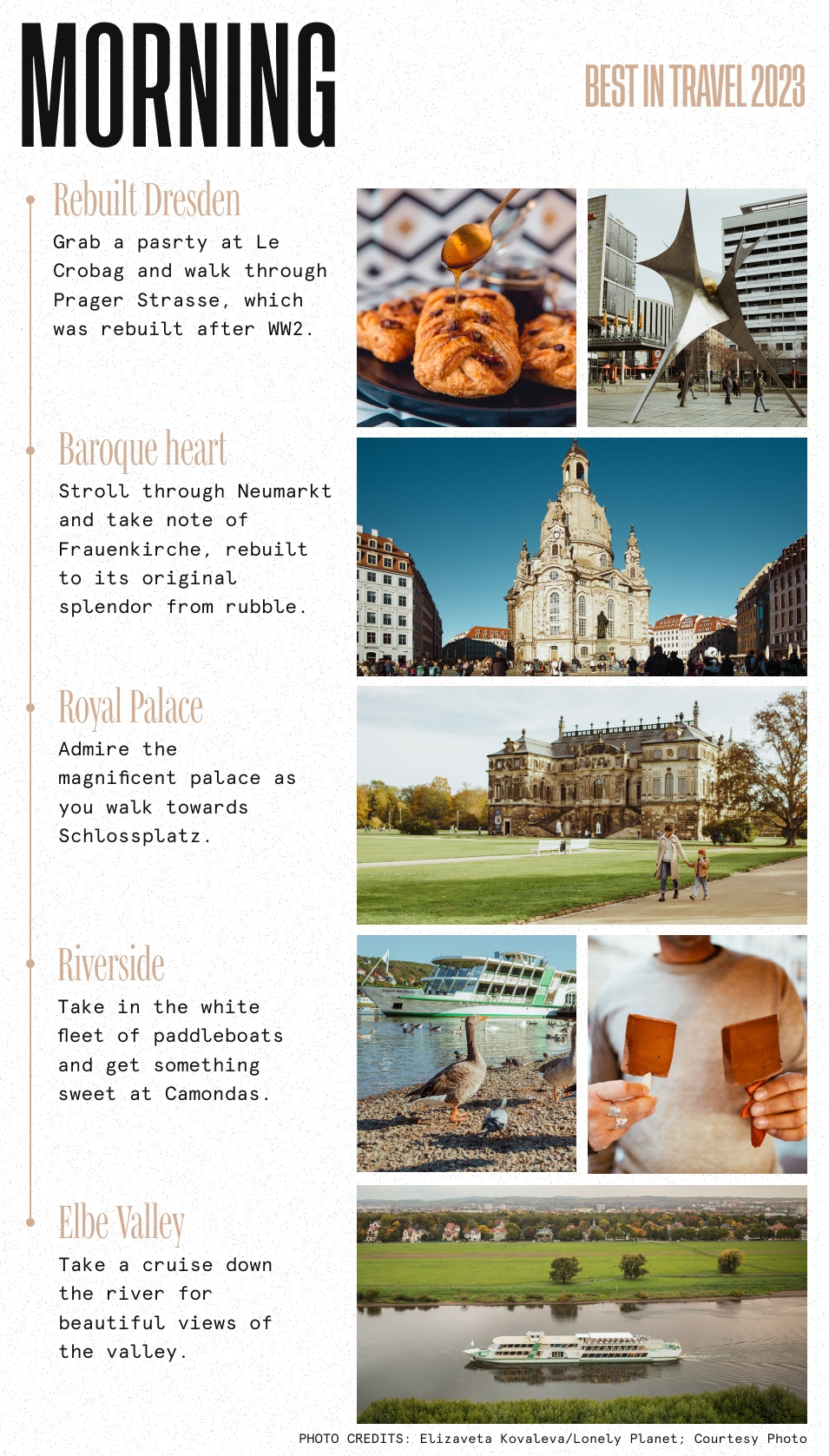Learn about Dresden's rebirth in one perfect day

Nov 15, 2022 • 8 min read

Tourists walk in the gardens of Pillnitz Castle in Dresden © Elizaveta Kovaleva/Lonely Planet
Located on the Elbe River in Saxony, Dresden's story is one of rebirth. Allied bombing leveled the city in 1945, but in the decades since the end of the war, renovations have restored the historical core into the vibrant city it was in the 18th century.
Dresden’s urban rebirth continues in 2023 with a second phase of renovations of the Altmarkt (central square) to include more accessibility and climate protection measures. The project is set to reopen in time for the 2023 Striezelmarkt, one of the oldest and largest Christmas markets.
Seema Prakash fell so in love with the city more than a decade ago, she moved here and began giving walking tours of the city and its history. She shows us a perfect day learning about Dresden.

Dresden bewitched me the moment I saw the sun rise over its domes and baroque skyline on a magical morning in 2009. I was traveling solo, fleeing from a deep personal crisis in order to take time off to consider my future, when Dresden’s legendary rising-from-the-ashes story resonated with my own – and set me off on my new career as a licensed guide. (Or as my mother called it: a psychohistorian!) More than a decade later, I know every one of Dresden’s graceful facets. To show guests my Dresden in a manner that is entertaining, informative and engaging is my personal credo

Why you should visit Dresden
Some of us believe that the Elbe slows down as it passes its beloved Dresden, kissing both banks before flowing onward. You can discover Dresden’s beauty in the lush wine-growing slopes along the river, as well as in the historic center: in squares ringed by iconic buildings, in tall steeples and towers of its churches, in airy cobbled courtyards and (especially) in the galleries of its sumptuous museums. After being nearly bombed into oblivion during WWII, Dresden has been lovingly rebuilt, and now waits to be discovered by discerning travelers who love culture, history and – of course – wine.

Morning: Arrive by train and visit the Altmarkt
8:30am – If you’re arriving in Dresden by train, grab a pastry from Le Crobag and exit the main station at Prager Strasse. Once the most expensive shopping street in Dresden, Prager Strasse was completely destroyed in WWII in the course of one night. In the 1960s, it was rebuilt to be the international face of socialist East Germany, with new apartments, shops, sculptures and fountains surrounding a pedestrianized area. Follow the crowds toward the large Altmarkt (Old Market Square), where the oldest Christmas market in Germany takes place in December. This will bring you face to face with the large, glass-fronted Kulturpalast (or the “House of Socialist Culture”), built in the early 1960s and today housing a library, philharmonic hall and other facilities. Walk further and enter the baroque heart of historic Dresden, left in ruins during the East German regime before major post–Cold War restorations.
Stroll through Neumarkt
Make your way toward Neumarkt and the imposing Frauenkirche, rebuilt to its original splendor using stones sourced from the rubble. This is the epitome of Dresden’s rising-from-the-ashes spirit, and a symbol of forgiveness and reconciliation. Stroll through the restaurants along narrow, cobbled Münzgasse, then walk up the stairs to the top of Brühl’s Terrace – which Goethe called the “Balcony of Europe” – to admire the views of city and the Elbe below. Turn left to the end of the terrace and follow the steps down to Schlossplatz, admiring the magnificent Dresden Cathedral and Royal Palace along the way. Pop into the cathedral to admire the extraordinary Silbermann organ, which was happily dismantled and stored safely during the war before its reinstallation.
9:30am – See more of the city by buying a ticket for a hop-on-hop-off bus tour, or heading to the riverbank for a seat on one of Dresden’s historic “white fleet” paddleboats. The bus will take you past the impressive Volkswagen Transparent Factory, the beautifully landscaped Grosser Garten (Great Garden) and over the 19th-century Blue Wonder bridge. (We recommend verifying the boat schedules and reserving tickets beforehand.)
Chocolate at Camondas
10am – Before your tour, spend a few minutes discovering why Dresden is known as the “Chocolate City.” Walk past the Procession of Princes (one of the largest porcelain paintings in the world) and through the Georgentor (an elaborately sculpted gateway), and toward Camondas. In this chocolate emporium, you can sample hot chocolate (try it with a dash of chili powder), chocolate ice cream, a large variety of chocolate truffles and pralines, even a small museum…it’s sheer chocolate heaven.
Take a river cruise of the Elbe
10:30am – If you opt for the boat (and we recommend doing so), rush to claim a seat on the top deck for clear views of the Elbe Valley. With its wine slopes, meadows and imposing “castles” (actually elaborate villas from the 19th century), the valley’s harmony of landscape and architecture has earned it a Unesco designation. During the ride’s 90 minutes, life takes on a dreamy, meandering tempo as you pass by other boats, paddling children, anglers, horses, people reading, grilling, walking dogs or cycling.

Neumarkt for Saxon lunch
12:30pm – Stroll back to Neumarkt, and consider your many options for lunch. Head down the stairs of the old gunpowder tower at Pulverturm restaurant, or grab a table at the cheery and bustling Dresden 1900 for authentic Saxon cuisine (think hearty potato soup and schnitzel with creamy mushroom sauce; if you’re hungry, tackle the giant pork knuckle). For a relaxed, leisurely meal, enjoy the elegant dining room at Grand Cafe Cosel. If you’d rather explore more, grab a fresh filled roll, slice of torte and coffee from one of the many nearby bakeries and enjoy some people-watching on the square as you eat.
2pm – Time for a dose of history, culture, iconic buildings and interesting stories, through a two-hour walking tour with a licensed guide – an absolute must.
Tour Residenzschloss
4:30–6pm – Get in a bit more culture with a visit to one of Dresden’s famous museums. My personal favorite is the Royal Palace (Residenzschloss), which combines reconstructed palace rooms and modern museum areas, taking you on a journey through the Renaissance and baroque eras. Look out for the original throne of Saxony, dresses and jewelry from the 16th to 18th centuries and portraits of the ruling family, plus armor, weapons and other personal objects fashioned out of precious metals and stones.

Check for a market in Altmarkt
6:30pm – Before leaving the Old Town, see if there’s a market happening in Altmarkt. In addition to the famous Christmas market, smaller events take place to mark transitions in seasons, offering a collection of quaint stalls with regional street food, handicrafts and drinks. If it’s wine-harvesting season, try a Federweisser, wild, frothy young wine; at Christmastime, a mulled Glühwine is a must. Zum Wohl!
Bohemian Neustadt and Kunsthofpassage
Now it's time to discover the other face of Dresden: grungy, edgy and bohemian Neustadt (New City). Take a tram or simply walk across Augustus Bridge, Dresden’s oldest, toward the statue of the Golden Rider, which depicts the conquering Saxon king Augustus the Strong confidently riding out in the direction of Poland. Follow Hauptstrasse – a once-wide baroque alley that was destroyed in the war and recreated as a boulevard in the 1970s in typical East German style – to Albertplatz, with its two gigantic fountains adorned with mermaids and mermen. Veer right in the direction of the 19th-century Gothic Revival Martin Luther Kirche, and take in some of Dresden’s only remaining Wilhelminian-style architecture, which features luxe stucco facade decorations, oriel windows and towers, and decorative wrought-iron doors.
As you walk through Neustadt, your goal is to get as lost as possible, as you discover street art, decipher graffiti, wander through small side streets and stumble across charming courtyards such as Roskolnikoff, a small restaurant that seems to have never been informed of East Germany’s fall. Look for the Kunsthofpassage, a series of connected, once-abandoned courtyards transformed by artists into whimsical streetscapes dotted with small boutiques.
Watch football at Katy's Garage
7:30pm – There are more than 200 bars and restaurants in Neustadt’s single square mile, some so small that they fit barely five guests at a time. If there is a football match on, head straight away for Katy’s Garage, an open-air bar with giant TV screens. Be sure to order a glass of the signature Erdbeerbowle – a potent punch made with fresh strawberries (when in season).
9pm – Set out for a pub crawl, or settle down in one of Neustadt’s many shisha bars (Habibi on the corner of Louisenstrasse and Martin Luther Strasse is a restaurant, cafe and shisha bar with great ambience). The day’s grand finale will take place at Franks Bar on Alaunstrasse. The hot spot’s young owner, Ilya, spent the pandemic year experimenting with ingredients to create his masterpiece: a Black Forest Cake in liquid (and alcohol-heavy) form. If that’s too heavy, his fresh-fruit daiquiris go down perfectly on a hot summer evening.
Walk to the middle of Carola Bridge to enjoy a splendid night-time view of Dresden – and linger over your goodbye, as the Elbe flows below you.
Have a bit more time? Seema has created an extended 4-day itinerary that features these highlights in Dresden and the surrounding area.



